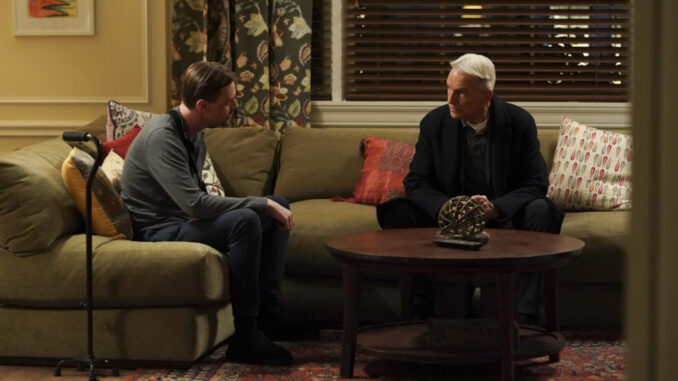
The fluorescent hum of the NCIS bullpen usually thrummed with a nervous energy, a symphony of clicking keyboards, hushed phone calls, and the distant clatter from autopsy. But tonight, it was a tomb of quiet, save for the occasional sigh of the building settling, and the soft, rhythmic tapping of Timothy McGee’s fingers against his coffee mug.
It was late, even for them. A particularly ugly case, involving a decorated Marine veteran whose hidden trauma had exploded into a tragedy, had dragged them through the emotional wringer. Gibbs, a man carved from granite and stubborn silence, had been even more unreadable than usual, his jaw perpetually clenched, his eyes distant and shadowed.
McGee, ever the observer, had seen the flicker. A momentary hesitation when Gibbs had looked at the veteran’s service photos, a subtle clenching of his hand when the medical examiner had described an old, faded scar on the victim’s shoulder. These were the only tells, the tiny cracks in the formidable armor that was Leroy Jethro Gibbs.
McGee was packing up, his own exhaustion a dull throb behind his eyes, when he heard a quiet creak. He looked up. Gibbs was still at his desk, not working, just sitting, a posture so uncharacteristic it sent a shiver down McGee’s spine. His gaze was fixed on something unseen, perhaps a ghost in the swirling dust motes caught in the single desk lamp he’d left on.
“You still here, Boss?” McGee ventured, his voice a tentative ripple in the stillness.
Gibbs didn’t stir for a long moment. Then, slowly, as if his muscles were stiff with disuse, he brought a hand up to the back of his neck, his fingers tracing a faint line just beneath his hairline. It was a gesture McGee had seen countless times, but never truly registered beyond a habitual scratch. Tonight, it was different. It held a peculiar weight.
“Some things,” Gibbs’s voice was a low growl, rougher than usual, “they don’t ever really heal, McGee. Just… scar over.”
McGee remained silent, his mug forgotten. He knew, instinctively, that this was not a moment for questions, for platitudes. This was a rare, fragile aperture in the wall Gibbs had built around himself, and any sudden movement might snap it shut.
Gibbs’s eyes, finally, met his. They were ancient, weary, reflecting a chasm of memory that McGee could only dimly imagine. He saw not just the sharp, unyielding stare of his boss, but the haunted gaze of a younger man, perhaps lost in a landscape of sand and blood.
“This one,” Gibbs murmured, his fingers still at his neck, “took a piece of shrapnel. Didn’t even feel it at first. Adrenaline’s a hell of a drug.” He paused, a muscle jumping in his jaw. “It was the quiet after, that got you. The quiet after the screaming stopped. That’s when the ghosts came calling.”
McGee swallowed, his throat suddenly dry. He had read the official reports, pieced together fragments of Gibbs’s legendary Marine career from dusty files and offhand comments. But those were facts, data points. This was something else entirely. This was raw, unvarnished truth.
Gibbs’s hand moved from his neck, his fingers absently tracing the line of an old, puckered scar on his forearm, half-hidden by his sleeve. It looked like an old burn, or perhaps a deep laceration that had healed poorly.
“This one,” Gibbs continued, his voice softer, almost a whisper, “was from a grenade. Thought I was dead for sure. But I wasn’t. And the others…” His gaze drifted back to the unseen distance. “They were. Or they wished they were.”
It wasn’t just the physical marks. McGee saw it now. The scars were deeper, etched into the very fabric of the man. The constant vigilance, the impenetrable resolve, the protective instincts that bordered on ferocity – these were not just personality traits. They were defenses, fortifications built against a torrent of memories Gibbs had long buried, or so he thought.
The true “war scars” weren’t just the ragged lines on Gibbs’s skin. They were the haunted silences, the flashes of pain in his eyes when a case echoed too closely, the way he carried the weight of every lost life, every difficult decision, like an invisible rucksack. They were the reason for the rules, for the isolation, for the profound, unspoken love he had for his team, a love born from the fear of losing them, too.
McGee didn’t speak. He didn’t need to. He simply watched, a profound understanding blossoming in his chest. He saw not just his intimidating boss, but a veteran who carried the silent screams of battles fought long ago, a man who had survived horrors and built a new life, brick by painful brick, out of the shattered remnants of his past.
The moment stretched, fragile and intimate, in the dim light of the bullpen. Then, with an almost imperceptible shake of his head, Gibbs pushed himself up, the brief, raw vulnerability receding behind his familiar stern mask.
“Go home, McGee,” he rasped, his voice back to its usual gravelly tone. “Get some sleep.”
And just like that, the window was gone. But something had fundamentally shifted. McGee knew, with a certainty that settled deep in his bones, that he had witnessed a sacred moment. He had been allowed, for the briefest instant, to glimpse the true cost of the man, the hidden wounds that forged the legend. And as he walked out into the quiet night, the city lights shimmering like distant stars, he carried not just the weight of the day’s case, but the quiet, profound honor of having shared, however fleetingly, in the unspoken burdens of Leroy Jethro Gibbs. The scars were not just on Gibbs, but now, a subtle, indelible mark, on McGee’s understanding of him.